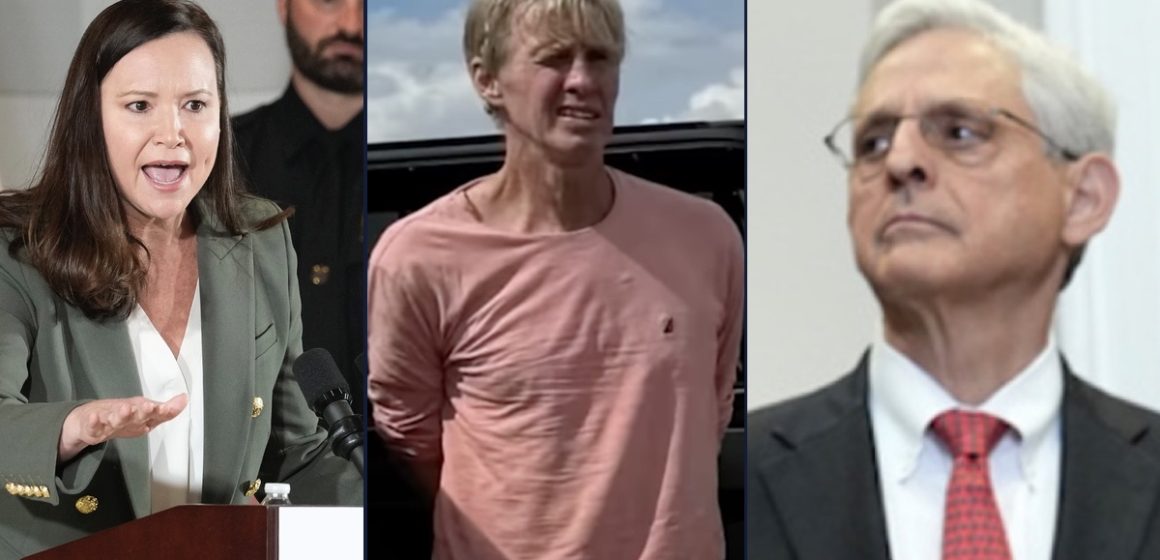After Florida’s attorney general told the federal government in a letter last month that she was “surprised” by a move to sideline a state probe of the latest suspected attempted assassination of former President Donald Trump, the Sunshine State has filed a lawsuit against U.S. Attorney General Merrick Garland to “vindicate” its “sovereign interest” in separately investigating Ryan Routh as ordered by Gov. Ron DeSantis (R).
The lawsuit, filed by AG Ashley Moody (R) in Fort Pierce but this time not assigned to U.S. District Judge Aileen Cannon, claims that the feds are violating the Tenth Amendment of the Constitution by invoking 18 U.S. Code § 351(f). The statute states that if “Federal investigative or prosecutive jurisdiction is asserted” in cases of attempted assassinations of major presidential candidates, then “such assertion shall suspend the exercise of jurisdiction by a State or local authority, under any applicable State or local law, until Federal action is terminated.”
The filing shows that Moody wrote a letter to FBI Director Christopher Wray and U.S. Attorney for the Southern District of Florida Markenzy Lapointe, claiming that she was “surprised” to see the government citing § 351(f) before Routh had even been charged with attempted assassination.
The letter, attached as an exhibit to the lawsuit, accused the feds of a “breathtaking intrusion on state sovereignty” and a “grave mistake” in seeking to “frustrate” a state investigation.

In response one week later, Lapointe told Moody that the federal government looks “forward to continued engagement to ensure that the active federal prosecution and any potential subsequent state prosecution are appropriately sequenced, in accordance with applicable law and consistent with practical considerations.”
“The federal indictment returned last week – which post-dates your letter – resolves any potential uncertainty about whether 18 USC 351(f) applies here and by any standard represents an assertion of that provision,” the U.S. attorney said. “While as you note, in enacting 18 USC 351(f), Congress plainly envisioned federal investigative and prosecutive primacy in the first instance for attempted assassinations such as occurred here, the same provision does not preclude state prosecutions permissibly following the conclusion of the federal prosecution—and in no way prevents the sharing of federal evidence with state authorities after the federal matter has ended.”
More Law&Crime coverage: Judge Cannon’s Mar-a-Lago dismissal apparently has Trump eyeing her to replace Jack Smith’s boss — and an accused would-be assassin noticed
After three weeks passed, Moody has asked U.S. District Judge K. Michael Moore, a George H.W. Bush appointee, to issue a declaratory judgment stating that Florida “may conduct its investigation without violating § 351(f)” or at least rule that the statute is “unconstitutional as applied to Florida” and prevent the feds from blocking the state probe.
“Florida sues to vindicate its sovereign interest to investigate violations of state law, as delay may impact the outcome of any prosecution,” the suit argued, noting later that “[e]vidence disappears, memories fade, and the State has no way to force the federal government to cooperate in the State’s prosecution.”
“Every day that Florida is prevented from investigating, the State’s case becomes harder to prove at trial,” the suit also said. “By contrast, the federal government suffers no injury from Florida investigating state law crimes, as the State has no intention of interfering with or obstructing the federal investigation.”
Moody asserted that the government’s “reading” of the statute at issue “would raise a substantial constitutional question because it would likely render § 351(f) unconstitutional under the Tenth Amendment.” If enforced, that would “constitute illegal executive action,” the court filing said.
Read the lawsuit here.
Read More:-
Have a tip we should know? tips@lawandcrime.com
Note: Thank you for visiting our website! We strive to keep you informed with the latest updates based on expected timelines, although please note that we are not affiliated with any official bodies. Our team is committed to ensuring accuracy and transparency in our reporting, verifying all information before publication. We aim to bring you reliable news, and if you have any questions or concerns about our content, feel free to reach out to us via email. We appreciate your trust and support!



Leave a Reply